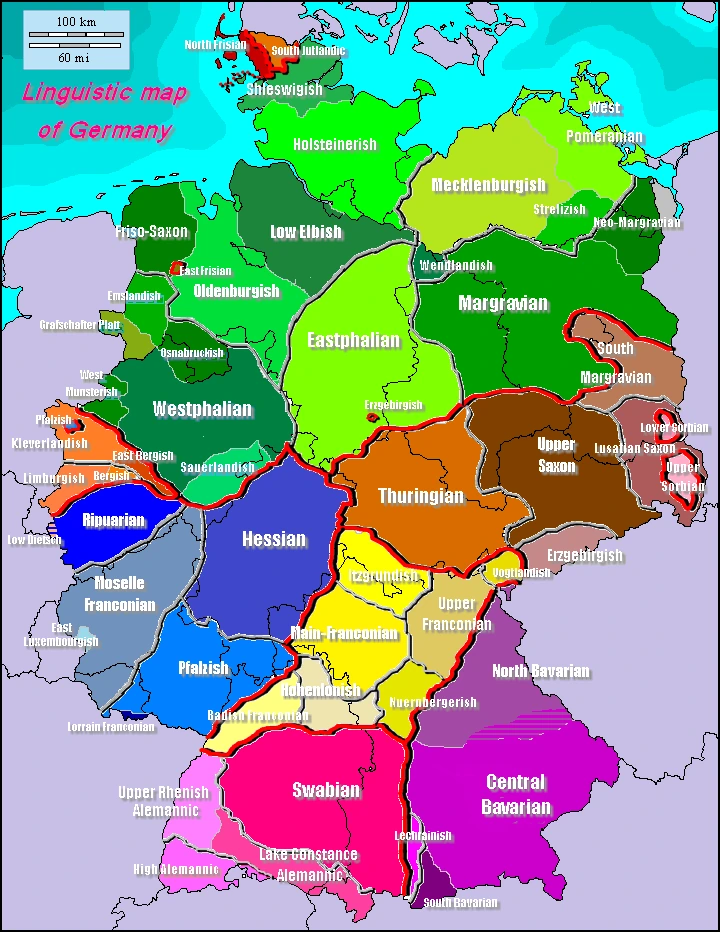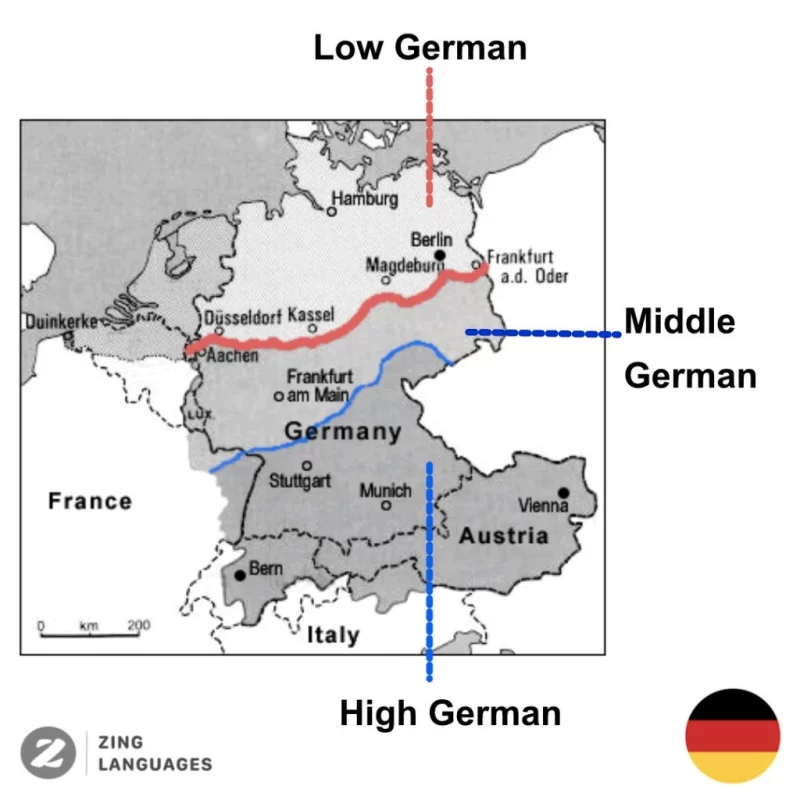Among the languages of Germany, German is the official and major language. The interesting fact is that there are four minority languages in Germany that exist alongside German.
The meaning of ‘Dog’ is Hund in some parts of Germany while not in other parts. Therefore, a lot of interesting mixes is involved in the languages spoken in Germany.
We shall take you through all the details that you are expected to know about all the languages spoken in this country. The German language is closely related to Low German, English, Dutch, Afrikaans, and Frisian.
German is one of the official languages of Switzerland.
Why Germany is called Deutschland in German?
A long time ago, Germans, a large group of tribes, settled in modern central Europe and southern Scandinavia.
One of the major tribes settled in the German region was Franks. Over time, the Franks moved to the territory of modern France. At the same time, some of them abandoned German language and began to use another language – one of the variants of Latin.
Those who continued to speak German (variant of Latin) developed their own language, which first sounded like “diutsch”, and later in high German, as “deutsch”.
In 843, the French state was divided. The formed language boundaries were taken as a basis, from which France and Germany were later formed as independent countries. To the already known to us “deutsch” the ending “-land” (“land, country”) was added.
Germany is called Deutschland because centuries ago some Germans decided to keep their usual language (variant of Latin).

Check out German Tongue Twisters.
High German Vs Low German Dialects
Germany can be classified as a multilingual country where 67% of Germans can speak at least one foreign language. Better still, about 27% of the population can speak at least two foreign languages.
There are about 31 distinct dialects spoken in Germany today. These dialects can be broadly classified into high German and Low German (minority language). High German and Low German differ in vocabulary.
| English | to sit | to make | apple | water | ape |
| High German | sitzen | machen | Apfel | Wasser | Affe |
| Low German | sitten | maken | Appel | Water | Aap |
Many myths are peddled about the German language such as the German language is difficult to grasp. This myth is far from the truth because, with little effort and an understanding of the English language, you can be an expert in the German language.

The Official Language in Germany
The official language in Germany is known as Standard German. The standard German stands somewhere between High German and Middle German. When you get to the European Union, this language is the most commonly spoken there, and it is one of the official and working languages of Germany and the EU.
Over 95% of the population in Germany speaks Standard Germany. The writing system is based on the Latin Script, and the vocabulary is based on the Germanic branch of language.
Minority Languages of Germany
Let us now take a look at each of the four minority languages of Germany that exist today:
Low German Language
This language is majorly spoken in northern Germany. This language is distinct from Standard German, and it is more closely related to English, Frisian, and Dutch (Read also: Languages of Netherlands).
There are an estimated 5 million speakers of this native language in Germany today.
Upper Sorbian language
The Upper Lusatia province is populated by Serbs who live in that province in Germany. The language that they speak there is the Upper Sorbian language. Today, the province is part of Saxony.
Lower Sorbian Language
The Serbs living in the Lower Lusatia historical province are native speakers of the Lower Sorbian Language. This province is now part of Brandenburg.
The lower Sorbian language is one of the endangered local languages in Germany because the native speakers are the elderly ones in the province. The stats show that about 0.09% of the population speak both the Upper and Lower Serbian language.
Frisian Language
Frisian is the language of the North Frisian province in Germany. the Frisian language is spoken by about 10,000 in the province.
Aside from the four above, other less prominent minority languages are spoken in Germany. For example, Romani and Danish languages are two of the minority languages of Germany. About 0.08% of the population speaks the Romani dialect, while 0.06% speak the Danish dialect.
Foreign Languages Of Germany
Among Europeans, the Germans speak better English. Do you know why? English is by far the most pronounced foreign language in Germany. English is also taught in German schools. The French and Latin languages are also taught as second and third languages in Germany.
Other languages such as Dutch, Spanish, Greek, Polish, and Russian are also taught in German schools depending on the geographical location of the place.
English As Official Language
It has been a topic for frequent discussion in various circles in Germany to recognize English as the official language in Germany. However, a survey conducted in the year 2013 in Germany shows that 59% of Germans support introducing English as the official language of the EU. This figure goes to show the plurality of languages that currently existed in Germany.
Curious about the status of the German language in the UK? Check out the languages of the UK.
Immigrant Languages Spoken In Germany
Aside from the foreign languages spoken in Germany, other immigrant languages have found space among the languages spoken in Germany.
These immigrants import their language to Germany, and today you will find such immigrant languages as Turkish, Polish, Balkan languages, Kurdish, and Russian. The table to the left represents the most spoken immigrant languages in Germany today.
Regional Languages Are More Important In Germany
When you get to the rural areas in Germany, standard Germany is of less importance there. The locals would rather speak their native dialects. The vocabulary varies from one region to the other.
The locals see their different dialects as a source of linguistic pride. However, when they are in discussion with a non-native, they switch the language to standard German.
| LANGUAGE | SPEAKERS (% OF POPULATION) |
|---|---|
| German | 95 |
| English | 56 |
| French | 15 |
| Russian | 5 |
| Turkish | 1.8 |
| Kurdish | 0.3 |
| Upper Sorbian | 0.09 |
| Lower Sorbian | 0.09 |
| Romani | 0.08 |
| Danish | 0.06 |
| North Frisian | 0.01 |
Conclusion
The above represents the breakdown of the languages of Germany. The German nation can be likened to a no man’s land-based on the various languages spoken in Germany. You can encounter all the listed languages above concerning the regions of the local dialect. You will find the language and people very interesting when you get to Germany.
Additional Reading: Online German A1 Course.

